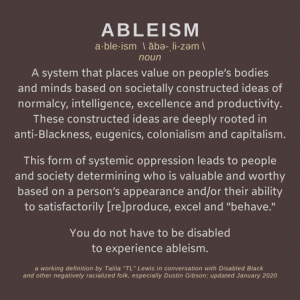ableism
noun
able·ism |\ ˈā-bə-ˌli-zəm \
Definition of ableism
: discrimination or prejudice against individuals with disabilities

RESOURCES:
Ableism 101: What it is, what it looks like, and what we can do to fix it
The Americans With Disabilities Act Remains Crucial In The Fight Against Ableism 29 Years Later
What is ableism, and what is its impact?
A comprehensive glossary of ableist terms by disability rights activist Lydia X. Z. Brown
So what, exactly, counts as ableism? How it tends to show up. Examples. Why does it happen? What’s the impact? How to avoid it. Questions to ask yourself. Words can have a lasting impact, too. The bottom line.
An excerpt from My Body Is Not a Prayer Request by Amy Kenny. Very good article on ablism and cultural identity.
Videos on Ableism
Disabling Ableism: The Modern Pathway to Inclusion
What is Ableism?
Confronting ableism: What it is and how we can challenge it
Things People With Disabilities Wish You Knew
See also “Eliminating Ableism in Education” THOMAS HEHIR Harvard Educational Review Vol. 72 No. 1 Spring 2002
